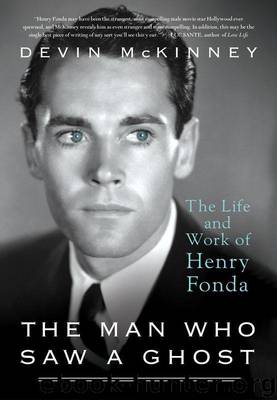The Man Who Saw a Ghost: The Life and Work of Henry Fonda by McKinney Devin

Author:McKinney, Devin [McKinney, Devin]
Language: eng
Format: mobi, epub, azw3
Publisher: St. Martin's Press
Published: 2012-10-01T21:00:00+00:00
10
He Not Busy Being Born
Once Upon a Time in the West
On a ranch in California’s Conejo Valley, some fifty miles northwest of Hollywood, Henry is trying to shoot a movie—a Western called Welcome to Hard Times.
“I’ve made lots of westerns here,” he tells a reporter, “but it won’t be long before even this place is gone.”
Just over the rise, bulldozers roar, clearing acres earmarked for the planned suburban community of Thousand Oaks. How the West was won, phase three.
* * *
The 1960s are about novelty, evolution, reinvention—in one word, transformation. The works and acts of visionaries as different as Martin Luther King, Jr., and the Beatles, Muhammad Ali and Norman Mailer, James Brown and Jane Fonda have in common a desire to destroy the accepted limits on social behavior and human capability. The decade’s defining figures are determined to live up to the transformative demands they have set themselves; that, and the enormity of popular response to this wholesale questioning of the traditional, is what makes the 1960s a glorious rupture in our recent time.
But for others, tradition is life. A man inclined to prize old values and protect old wounds is bound to feel he was not made for these days. Venerated by one segment of society, he may find himself the target of another, one whose faith is defined in a line of Bob Dylan’s: “He not busy being born is busy dying.”
This man may feel that even his children are hastening that end. By decade’s end, “Kill your parents” has become the Dylan line’s sinister complement. Parricide, the unvoiced desire, finds voice in some widely noted words and images—Jim Morrison climaxing a Doors song by raping his mother and murdering his father; 1968’s Wild in the Streets, in which a nineteen-year-old becomes president and parents are force-fed LSD in pogroms; Weatherman Bill Ayers’s declaration, “Bring the revolution home. Kill your parents. That’s where it’s really at”; or Charles Manson warning straight America that its children are “running in the streets—and they are coming right at you!”
* * *
In 1966, Henry Fonda becomes an institution. His sixtieth film, A Big Hand for the Little Lady, is released in June; later that month, a party is held at New York’s swanky L’Etoile restaurant to mark his third decade of Hollywood stardom. The celebration serves as overture to a Fonda film retrospective at the New Yorker Theater, and as coda to his stage comeback in a hit comedy, Generation, now closing after three hundred performances.
The play has more than done its business, and Henry’s reviews have been impeccable. But it may chafe him to find anniversaries and retrospectives suddenly abounding. In a piece accompanying the retrospective, Peter Bogdanovich writes: “Were he never to play another role, his Lincoln, his Mister Roberts, his Earp, his Tom Joad would have immortalized him … as a special, most individual aspect of The American.” The words are truthful and sincere, and sound like an elegy.
Right now, the Fonda kids are more to the point.
Download
The Man Who Saw a Ghost: The Life and Work of Henry Fonda by McKinney Devin.epub
The Man Who Saw a Ghost: The Life and Work of Henry Fonda by McKinney Devin.azw3
This site does not store any files on its server. We only index and link to content provided by other sites. Please contact the content providers to delete copyright contents if any and email us, we'll remove relevant links or contents immediately.
| Actors & Actresses | Directors |
The Kite Runner by Khaled Hosseini(5179)
Gerald's Game by Stephen King(4654)
Dialogue by Robert McKee(4404)
The Perils of Being Moderately Famous by Soha Ali Khan(4220)
The 101 Dalmatians by Dodie Smith(3511)
Story: Substance, Structure, Style and the Principles of Screenwriting by Robert McKee(3469)
The Pixar Touch by David A. Price(3439)
Confessions of a Video Vixen by Karrine Steffans(3309)
How Music Works by David Byrne(3270)
Harry Potter 4 - Harry Potter and The Goblet of Fire by J.K.Rowling(3074)
Fantastic Beasts: The Crimes of Grindelwald by J. K. Rowling(3059)
Slugfest by Reed Tucker(3004)
The Mental Game of Writing: How to Overcome Obstacles, Stay Creative and Productive, and Free Your Mind for Success by James Scott Bell(2909)
4 - Harry Potter and the Goblet of Fire by J.K. Rowling(2703)
Screenplay: The Foundations of Screenwriting by Syd Field(2643)
The Complete H. P. Lovecraft Reader by H.P. Lovecraft(2563)
Scandals of Classic Hollywood: Sex, Deviance, and Drama from the Golden Age of American Cinema by Anne Helen Petersen(2524)
Wildflower by Drew Barrymore(2489)
Robin by Dave Itzkoff(2441)
